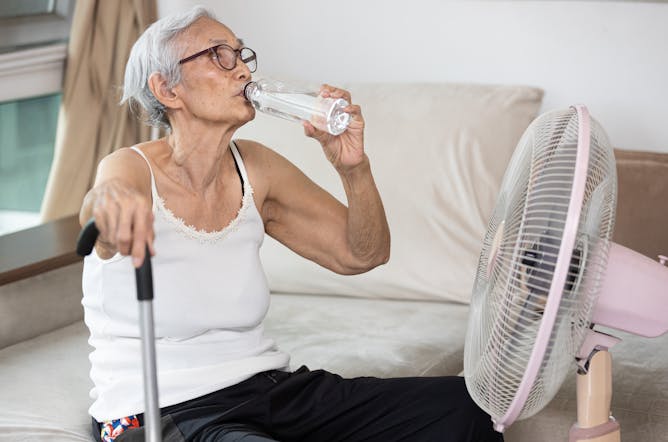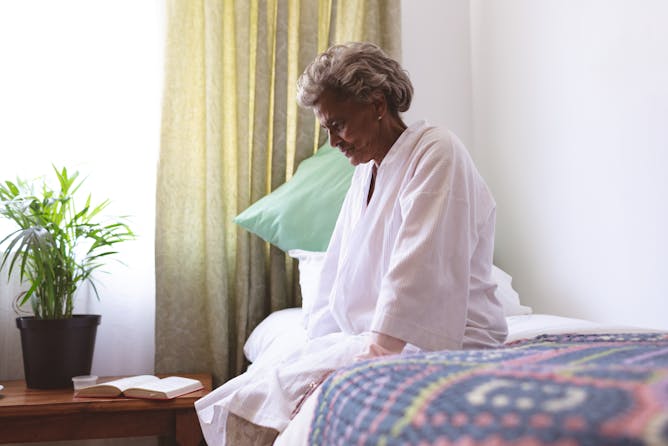|
Work has become an around-the-clock activity, courtesy of the pandemic and technology that makes us reachable anytime, anywhere. Throw in expectations to deliver fast and create faster and it becomes hard to take a step back.
Not surprisingly, many of us are feeling burned out. Today in The Conversation Canada, Claudine Mangen from Concordia University provides tips on dealing with burnout at work.
From setting boundaries to talking openly about burnout and prioritizing yourself, Mangen says burnout is a serious problem that deserves all of our attention.
Also today:
All the best.
|

|
Haley Lewis
Culture + Society Editor | Producer, Don't Call Me Resilient
|
|

Healthcare workers faced excessive burnout during the pandemic.
(Shutterstock)
Claudine Mangen, Concordia University
Burnout is a serious problem that deserves all of our attention. An academic who studies the issue offers some practical tips to deal with the problems associated with burnout.
|

Virtual assistants are becoming a more common household fixture, and many children are growing up and interacting with them.
(Shutterstock)
Stephen J. Neville, York University, Canada; Natalie Coulter, York University, Canada
Children’s voices and actions are recorded by virtual assistants, but what is being done with all the collected information?
|

Edmonton demonstrators gather to protest against COVID-19 measures and support the ‘freedom convoy’ in February 2022. Research suggests Alberta separatist sentiments have as much to do with antipathy about the federal government and Justin Trudeau as actually leaving Confederation.
THE CANADIAN PRESS/Jason Franson
Jared Wesley, University of Alberta; Lisa Young, University of Calgary
Even though they lack the profile of Québec sovereigntists, Alberta separatists are positioned to exert significant political influence on intergovernmental relations in the years to come.
|

Health-care workers in Toronto protest the Canadian truckers convoy last February that was against vaccine mandates.
(Shutterstock)
Aviva Philipp-Muller, Simon Fraser University; Richard Petty, The Ohio State University; Spike W. S. Lee, University of Toronto
To communicate scientific findings that are relevant to the public, science communicators need to understand how to overcome attitudes that are anti-science.
|

New research finds that many Canadian households may be struggling to pay their energy bills or limiting their energy use when they need it most.
(Shutterstock)
Runa Das, Royal Roads University; Mari Martiskainen, University of Sussex
Rising temperatures — and inflation — are increasing household energy bills. Many Canadians are struggling to meet their basic energy needs.
|

Communities that are underrepresented in research may also be at increased risk for dementia, or tend to experience dementia differently, often with poorer quality of care, later diagnoses and at possibly higher rates than the general population.
(Shutterstock)
Roger Wong, University of British Columbia; Saskia Sivananthan, McGill University
Much dementia research does not reflect ethnically diverse communities. Studies used to make policy, clinical and investment decisions in dementia should reflect the diverse Canadian population.
|
La Conversation Canada
|

XXX.
Shutterstock
Suzie Beaulieu, Université Laval; Leif Michael French, Sam Houston State University
Selon une étude récente, après un séjour moyen de près d’un an au Québec, moins d’un tiers des immigrants avaient atteint les objectifs terminaux du cours de langue offert par la province.
|
Ukraine Invasion
|
-
Juris Pupcenoks, Marist College
What do Estonia, Latvia, Lithuania, Poland, Moldova and Kazakhstan have in common with Ukraine? Russian allegations that they are all overrun by Nazis.
|
|
Arts
|
-
Chijioke Ngobili, University of Nigeria
Nigerian popular music - Afrobeats - is storming the world’s stages. But it’s just the latest stage in a vibrant century of recorded music in the country.
|
|
Politics
|
-
Niro Kandasamy, University of Sydney
Protestors are occupying the presidential palace and Sri Lankans are suffering shortages of food, petrol and other supplies. The country is in chaos- and it isn’t just because of the economy.
|
|
Science + Tech
|
-
Chris Impey, University of Arizona; Daniel Apai, University of Arizona
Life on Earth has dramatically changed the chemistry of the planet. Astronomers will measure light that bounces off distant planets to look for similar clues that they host life.
|
|
|
|
| |
| |
| |
| |
|
|